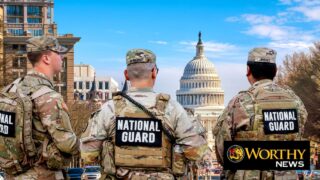by Emmitt Barry, with reporting from Washington D.C. Bureau Staff
(Worthy News) – The Trump administration late on Nov. 25 filed a notice of appeal challenging a federal district court ruling that ordered the government to halt its months-long deployment of National Guard troops in Washington, D.C.
President Donald Trump had authorized the deployment under an Aug. 11 presidential memorandum, arguing that the District had “lost control of public order and safety” and citing violent crime rates as justification. The administration also said the Guard supported federal immigration enforcement operations in the capital.
U.S. District Judge Jia Cobb ruled on Nov. 20 that the deployment violated constitutional limits on presidential power, concluding that the president may activate the D.C. National Guard only under specific statutory conditions—not, as she wrote, under a “free-floating Article II power to deploy the Guard for the deterrence of crime.”
Cobb held that only Congress may define when the president can assume control of the D.C. Guard, and that federal law requires a request from local civil authorities before the Guard may be used for riot control or domestic disturbances—something the D.C. government did not issue. She paused her ruling for 21 days to allow for appeal.
Background: A Disputed History of Guard Authority in Washington
The legal battle unfolds against a long backdrop of contested federal authority over the D.C. National Guard. Unlike state Guards, the D.C. Guard is controlled directly by the president—a structure created by Congress and reaffirmed in multiple statutes over the past century.
Past disputes have touched on presidential limits as well. Courts have repeatedly upheld that presidential deployment of Guard forces domestically must be tied to specific statutory triggers such as the Insurrection Act, riot suppression statutes, or requests from local government. Judges have historically rejected broad claims of inherent presidential authority to use Guard troops for generalized crime control or policing functions.
Those precedents formed the core of Judge Cobb’s reasoning, who wrote that “historical practice confirms” that the president’s authority over the D.C. Guard is not open-ended.
Arguments from Both Sides
During October hearings, D.C. attorney Mitchell Reich argued the administration “has no statute authorizing” a policing-style deployment and warned the federal government’s interpretation would create an unchecked presidential police force in the capital.
Deputy Assistant U.S. Attorney General Eric Hamilton countered that Guard members were performing “protective functions” rather than law enforcement and said temporary detentions amounted to neutralizing threats, not enforcing laws.
The administration’s one-page notice of appeal did not outline its legal rationale but sends the case to the U.S. Court of Appeals for the D.C. Circuit, which will now decide how far presidential authority extends deploying the national guard over the capital.
Copyright 1999-2026 Worthy News. This article was originally published on Worthy News and was reproduced with permission.
The following code is how the above article is generated with the Worthy Suite WordPress Plugin.
[worthy_plugins_news_story_body]This is how you display a story with an image.
Trump Administration Appeals Ruling Blocking D.C. National Guard Deployment

by Emmitt Barry, with reporting from Washington D.C. Bureau Staff
(Worthy News) – The Trump administration late on Nov. 25 filed a notice of appeal challenging a federal district court ruling that ordered the government to halt its months-long deployment of National Guard troops in Washington, D.C.
President Donald Trump had authorized the deployment under an Aug. 11 presidential memorandum, arguing that the District had “lost control of public order and safety” and citing violent crime rates as justification. The administration also said the Guard supported federal immigration enforcement operations in the capital.
U.S. District Judge Jia Cobb ruled on Nov. 20 that the deployment violated constitutional limits on presidential power, concluding that the president may activate the D.C. National Guard only under specific statutory conditions—not, as she wrote, under a “free-floating Article II power to deploy the Guard for the deterrence of crime.”
Cobb held that only Congress may define when the president can assume control of the D.C. Guard, and that federal law requires a request from local civil authorities before the Guard may be used for riot control or domestic disturbances—something the D.C. government did not issue. She paused her ruling for 21 days to allow for appeal.
Background: A Disputed History of Guard Authority in Washington
The legal battle unfolds against a long backdrop of contested federal authority over the D.C. National Guard. Unlike state Guards, the D.C. Guard is controlled directly by the president—a structure created by Congress and reaffirmed in multiple statutes over the past century.
Past disputes have touched on presidential limits as well. Courts have repeatedly upheld that presidential deployment of Guard forces domestically must be tied to specific statutory triggers such as the Insurrection Act, riot suppression statutes, or requests from local government. Judges have historically rejected broad claims of inherent presidential authority to use Guard troops for generalized crime control or policing functions.
Those precedents formed the core of Judge Cobb’s reasoning, who wrote that “historical practice confirms” that the president’s authority over the D.C. Guard is not open-ended.
Arguments from Both Sides
During October hearings, D.C. attorney Mitchell Reich argued the administration “has no statute authorizing” a policing-style deployment and warned the federal government’s interpretation would create an unchecked presidential police force in the capital.
Deputy Assistant U.S. Attorney General Eric Hamilton countered that Guard members were performing “protective functions” rather than law enforcement and said temporary detentions amounted to neutralizing threats, not enforcing laws.
The administration’s one-page notice of appeal did not outline its legal rationale but sends the case to the U.S. Court of Appeals for the D.C. Circuit, which will now decide how far presidential authority extends deploying the national guard over the capital.
Copyright 1999-2026 Worthy News. This article was originally published on Worthy News and was reproduced with permission.
[worthy_plugins_news_story_title]
<div style="text-align:right; padding:0px 0px 10px 15px; float:right; width:300px;"><img src="[worthy_plugins_news_story_image name=sm_medium]" alt="" /></div>[worthy_plugins_news_story_body]